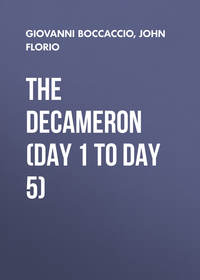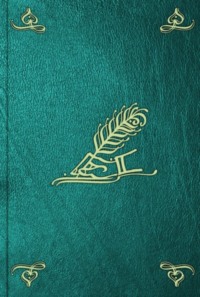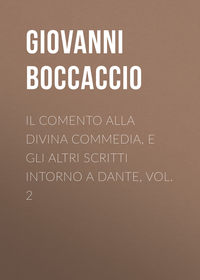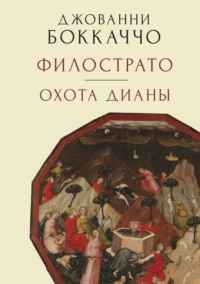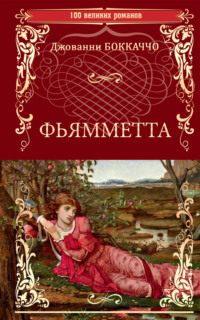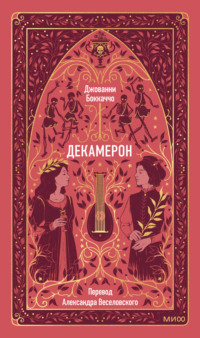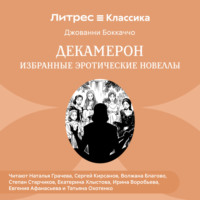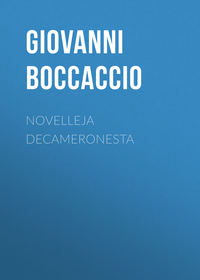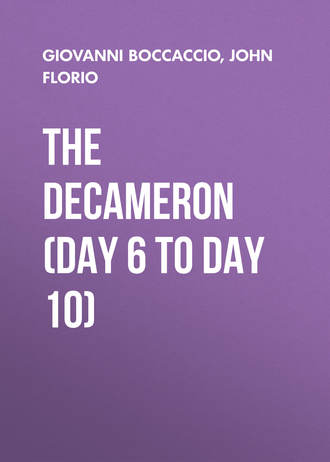 полная версия
полная версияThe Decameron (Day 6 to Day 10)
Our frolicke Baker perceiving, that Messer Geri Spina and the other Ambassadors, used every morning to passe by his doore, and afterward to returne backe the same way: seeing the season to be somewhat hot & soultry, he tooke it as an action of kindnesse and courtesie, to make them an offer of tasting his white wine. But having respect to his own meane degree, and the condition of Messer Geri; hee thought it farre unfitting for him, to be so forward in such presumption; but rather entred into consideration of some such meanes, whereby Messer Geri might bee the inviter of himselfe to taste his Wine. And having put on him a trusse or thin doublet, of very white and fine Linnen cloath, as also breeches, and an apron of the same, and a white cap upon his head, so that he seemed rather to be a Miller, then a Baker: at such times as Messer Geri and the Ambassadors should daily passe by, hee set before his doore a new Bucket of faire water, and another small vessell of Bologna earth (as new and sightly as the other) full of his best and choisest white Wine, with two small Glasses, looking like silver, they were so cleare. Downe he sate, with all this provision before him, and emptying his stomacke twice or thrice, of some clotted flegmes which seemed to offend it: even as the Gentlemen were passing by, he dranke one or two rouses of his Wine so heartily, and with such a pleasing appetite, as might have moved a longing (almost) in a dead man.
Messer Geri well noting his behaviour, and observing the verie same course in him two mornings together; on the third day (as he was drinking) he said unto him. Well done Cistio, what, is it good, or no? Cistio starting up, forthwith replyed: Yes Sir, the wine is good indeed, but how can I make you to beleeve me, except you taste of it? Messer Geri, eyther in regard of the times quality, or by reason of his paines taken, perhaps more then ordinary, or else, because hee saw Cistio had drunke so sprightly, was very desirous to taste of the Wine, and turning unto the Ambassadors, in merriment he saide. My Lords, me thinks it were not much amisse, if we tooke a taste of this honest mans Wine, perhaps it is so good, that we shall not neede to repent our labour.
Heereupon, he went with them to Cistio, who had caused an handsome seate to be fetched forth of his house, whereon he requested them to sit downe, and having commanded his men to wash cleane the Glasses, he saide. Fellowes, now get you gone, and leave me to the performance of this service; for I am no worse a skinker, then a Baker, and tarry you never so long, you shall not drinke a drop. Having thus spoken, himselfe washed foure or five small glasses, faire and new, and causing a Viall of his best wine to be brought him: hee diligently filled it out to Messer Geri and the Ambassadours, to whom it seemed the very best Wine, that they had drunke of in a long while before. And having given Cistio most hearty thankes for his kindnesse, and the Wine his due commendation: many dayes afterwardes (so long as they continued there) they found the like courteous entertainment, and with the good liking of honest Cistio.
But when the affayres were fully concluded, for which they were thus sent to Florence, and their parting preparation in due readinesse: Messer Geri made a very sumptuous Feast for them, inviting thereto the most part of the honourablest Citizens, and Cistio to be one amongst them; who (by no meanes) would bee seene in an assembly of such State and pompe, albeit he was thereto (by the saide Messer Geri) most earnestly entreated.
In regard of which deniall, Messer Geri commaunded one of his servants, to take a small Bottle, and request Cistio to fill it with his good Wine; then afterward, to serve it in such sparing manner to the Table, that each Gentleman might be allowed halfe a glasse-full at their down-sitting. The Serving-man, who had heard great report of the Wine, and was halfe offended, because he could never taste thereof: tooke a great Flaggon Bottle, containing foure or five Gallons at the least, and comming there-with unto Cistio, saide unto him. Cistio, because my Master cannot have your companie among his friends, he prayes you to fill this Bottle with your best Wine. Cistio looking uppon the huge Flaggon, replied thus. Honest Fellow, Messer Geri never sent thee with such a Message to me: which although the Servingman very stoutly maintained, yet getting no other answer, he returned backe therewith to his Master.
Messer Geri returned the Servant backe againe unto Cistio, saying: Goe, and assure Cistio, that I sent thee to him, and if hee make thee any more such answeres, then demaund of him, to what place else I should send thee? Being come againe to Cistio, hee avouched that his Maister had sent him, but Cistio affirming, that hee did not: the Servant asked, to what place else hee should send him? Marrie (quoth Cistio) unto the River of Arno, which runneth by Florence, there thou mayest be sure to fill thy Flaggon. When the Servant had reported this answer to Messer Geri, the eyes of his understanding beganne to open, and calling to see what Bottle hee had carried with him: no sooner looked he on the huge Flaggon, but severely reproving the sawcinesse of his Servant, hee sayde. Now trust mee, Cistio told thee nothing but trueth, for neither did I send thee with any such dishonest message, nor had the reason to yeeld or grant it.
Then he sent him with a bottle of more reasonable competencie, which so soone as Cistio saw: Yea mary my friend, quoth he, now I am sure that thy Master sent thee to me, and he shall have his desire with all my hart. So, commaunding the Bottle to be filled, he sent it away by the Servant, and presently following after him, when he came unto Messer Geri, he spake unto him after this manner. Sir, I would not have you to imagine, that the huge flaggon (which first came) did any jotte dismay mee; but rather I conceyved, that the small Viall whereof you tasted every morning, yet filled many mannerly Glasses together, was fallen quite out of your remembrance; in plainer tearmes, it beeing no Wine for Groomes or Peazants, as your selfe affirmed yesterday. And because I meane to bee a Skinker no longer, by keeping Wine to please any other pallate but mine owne: I have sent you halfe my store, and heereafter thinke of mee as you shall please. Messer Geri tooke both his guifte and speeches in most thankefull manner, accepting him alwayes after, as his intimate Friend, because he had so graced him before the Ambassadours.
Madame Nonna de Pulci, by a sodaine answere, did put to silence a Byshop of Florence, and the Lord Marshall: having moved a question to the said Lady, which seemed to come short of honestyThe Third Novell
Wherein is declared, that mockers do sometimes meete with their matches in mockery, and to their owne shameWhen Madame Pampinea had ended her Discourse, and (by the whole company) the answere and bounty of Cistio, had past with deserved commendation: it pleased the Queene, that Madame Lauretta should next succeed: whereupon verie chearefully thus she beganne.
Faire assembly, Madame Pampinea (not long time since) gave beginning, and Madam Philomena hath also seconded the same argument, concerning the slender vertue remaining in our sexe, and likewise the beautie of wittie words, delivered on apt occasion, and in convenient meetings. Now, because it is needlesse to proceede any further, then what hath beene already spoken: let mee onely tell you (over and beside) and commit it to memorie, that the nature of meetings and speeches are such, as they ought to nippe or touch the hearer, like unto the Sheepes nibling on the tender grasse, and not as the sullen Dogge byteth. For, if their biting be answereable to the Dogges, they deserve not to be termed witty jests or quips, but foule and offensive language: as plainly appeareth by the words of Madame Oretta, and the merry, yet sensible answer of Cistio.
True it is, that if it be spoken by way of answer, and the answerer biteth doggedly, because himselfe was bitten in the same manner before: he is the lesse to bee blamed, because hee maketh payment but with coine of the same stampe. In which respect, an especiall care is to bee had, how, when, with whom, and where we jest or gibe, whereof very many proove too unmindfull, as appeared (not long since) by a Prelate of ours, who met with a byting, no lesse sharpe and bitter, then had first come from himselfe before, as verie briefely I intend to tell you how.
Messer Antonio d'Orso, being Byshoppe of Florence, a vertuous, wise, and reverend Prelate; it fortuned that a Gentleman of Catalogna, named Messer Diego de la Ratta, and Lord Marshall to King Robert of Naples, came thither to visite him. Hee being a man of very comely personage, and a great observer of the choysest beauties in Court: among all the other Florentine Dames, one proved to bee most pleasing in his eye, who was a verie faire Woman indeede, and Neece to the Brother of the saide Messer Antonio.
The Husband of this Gentlewoman (albeit descended of a worthie Family) was, neverthelesse, immeasurably covetous, and a verie vile harsh natured man. Which the Lord Marshall understanding, made such a madde composition with him, as to give him five hundred Ducates of Gold, on condition, that hee would let him lye one night with his wife, not thinking him so base minded as to give consent. Which in a greedy avaritious humour he did, and the bargaine being absolutely agreed on; the Lord Marshall prepared to fit him with a payment, such as it should be. He caused so many peeces of silver to be cunningly guilded, as then went for currant mony in Florence, and called Popolines, & after he had lyen with the Lady (contrary to her will and knowledge, her husband had so closely carried the businesse) the money was duely paid to the cornuted Coxcombe. Afterwards, this impudent shame chanced to be generally knowne, nothing remaining to the wilful Wittoll, but losse of his expected gaine, and scorne in every place where he went. The Bishop likewise (beeing a discreete and sober man) would seeme to take no knowledge thereof; but bare out all scoffes with a well setled countenance.
Within a short while after, the Bishop and the Lord Marshal (alwaies conversing together) it came to passe, that upon Saint Johns day, they riding thorow the City, side by side, and viewing the brave beauties, which of them might best deserve to win the prize; the Byshop espied a young married Lady (which our late greevous pestilence bereaved us of) she being named Madame Nonna de Pulci, and Cousine to Messer Alexio Rinucci, a Gentleman well knowne unto us all. A very goodly beautifull young woman she was, of delicate language, and singular spirite, dwelling close by S. Peters gate. This Lady did the Bishop shew to the Marshall, and when they were come to her, laying his hand uppon her shoulder, he said. Madam Nonna, What thinke you of this Gallant? Dare you adventure another wager with him?
Such was the apprehension of this witty Lady, that these words seemed to taxe her honour, or else to contaminate the hearers understanding, whereof there were great plenty about her, whose judgement might be as vile, as the speeches were scandalous. Wherefore, never seeking for any further purgation of her cleare conscience, but onely to retort taunt for taunt, presently thus she replied. My Lord, if I should make such a vile adventure, I would looke to bee payde with better money.
These words being heard both by the Bishop and Marshall, they felt themselves touched to the quicke, the one, as the Factor or Broker, for so dishonest a businesse, to the Brother of the Bishop; and the other, as receiving (in his owne person) the shame belonging to his Brother. So, not so much as looking each on other, or speaking one word together all the rest of that day, they rode away with blushing cheekes. Whereby we may collect, that the young Lady, being so injuriously provoked, did no more then well became her, to bite their basenesse neerely, that so abused her openly.
Chichibio, the Cooke to Messer Currado Gianfiliazzi, by a sodaine pleasant answer which he made to his Master; converted his anger into laughter, and thereby escaped the punishment, that Messer meant to impose on himThe Fourth Novell
Whereby plainly appeareth, that a sodaine witty and merry answer, doth oftentimes appease the furious choller of an angry manMadam Lauretta sitting silent, and the answer of Lady Nonna having past with generall applause: the Queene commanded Madame Neiphila to follow next in order; who instantly thus began. Although a ready wit (faire Ladies) doth many times affoord worthy and commendable speeches, according to the accidents happening to the speaker: yet notwithstanding, Fortune (being a ready helper divers wayes to the timorous) doth often tippe the tongue with such a present reply, as the partie to speake, had not so much leysure as to thinke on, nor yet to invent; as I purpose to let you perceive, by a pretty short Novell.
Messer Currado Gianfiliazzi (as most of you have both seene and knowen) living alwayes in our Citie, in the estate of a Noble Citizen, beeing a man bountifull, magnificent, and within the degree of Knighthoode: continually kept both Hawkes and Hounds, taking no meane delight in such pleasures as they yeelded, neglecting (for them) farre more serious imployments, wherewith our present subject presumeth not to meddle. Upon a day, having kilde with his Faulcon a Crane, neere to a Village called Peretola, and finding her to be both young and fat, he sent it to his Cooke, a Venetian borne, and named Chichibio, with command to have it prepared for his supper. Chichibio, who resembled no other, then (as he was indeede) a plaine, simple, honest merry fellow, having drest the Crane as it ought to bee, put it on the spit, and laide it to the fire.
When it was well neere fully roasted, and gave forth a very delicate pleasing savour; it fortuned that a young Woman dwelling not far off, named Brunetta, and of whom Chichibio was somewhat enamored, entred into the Kitchin, and feeling the excellent smell of the Crane, to please her beyond all savours, that ever she had felt before: she entreated Chichibio verie earnestly, that hee would bestow a legge thereof on her. Whereto Chichibio (like a pleasant companion, and evermore delighting in singing) sung her this answer.
My Brunetta, faire and feat a,Why should you say so?The meate of my Master,Allowes you for no Taster,Go from the Kitchin go.Many other speeches past betweene them in a short while, but in the end, Chichibio, because hee would not have his Mistresse Brunetta angrie with him; cut away one of the Cranes legges from the spit, and gave it to her to eate. Afterward, when the Fowle was served up to the Table before Messer Currado, who had invited certain strangers his friends to sup with him, wondering not a little, he called for Chichibio his Cook; demanding what was become of the Cranes other legge? Whereto the Venetian (being a lyar by Nature) sodainely answered: Sir, Cranes have no more but one legge each Bird. Messer Currado, growing verie angry, replyed. Wilt thou tell me, that a Crane hath no more but one legge? Did I never see a Crane before this? Chichibio persisting resolutely in his deniall, saide. Beleeve me Sir, I have told you nothing but the truth, and when you please, I wil make good my wordes, by such Fowles as are living.
Messer Currado, in kinde love to the strangers that hee had invited to supper, gave over any further contestation; onely he said. Seeing thou assurest me, to let me see thy affirmation for truth, by other of the same Fowles living (a thing which as yet I never saw, or heard of) I am content to make proofe thereof to morrow morning, till then I shall rest satisfied: but, upon my word, if I finde it otherwise, expect such a sound payment, as thy knavery justly deserveth, to make thee remember it all thy life time. The contention ceassing for the night season, Messer Currado, who though he had slept well, remained still discontented in his minde: arose in the morning by breake of day, and puffing & blowing angerly, called for his horses, commanding Chichibio to mount on one of them; so riding on towards the River, where (earely every morning) he had seene plenty of Cranes, he sayde to his man; We shall see anon Sirra, whether thou or I lyed yesternight.
Chichibio perceiving, that his Masters anger was not (as yet) asswaged, and now it stood him upon, to make good his lye; not knowing how he should do it, rode after his Master, fearfully trembling all the way. Gladly he would have made an escape, but hee could not by any possible meanes, and on every side he looked about him, now before, and after behinde, to espy any Cranes standing on both their legges, which would have bin an ominous sight to him. But being come neere to the River, he chanced to see (before any of the rest) upon the banke thereof, about a dozen Cranes in number, each of them standing but upon one legge, as they use to do when they are sleeping. Whereupon, shewing them quickly to Messer Currado, he said. Now Sir your selfe may see, whether I told you true yesternight, or no: I am sure a Crane hath but one thigh, and one leg, as all here present are apparant witnesses, and I have bin as good as my promise.
Messer Currado looking on the Cranes, and well understanding the knavery of his man, replyed: Stay but a little while sirra, & I will shew thee, that a Crane hath two thighes, and two legges. Then riding somwhat neerer to them, he cryed out aloud, Shough, shough, which caused them to set downe their other legs, and all fled away, after they had made a few paces against the winde for their mounting. So going unto Chichibio, he said: How now you lying Knave, hath a Crane two legs, or no? Chichibio being well-neere at his wits end, not knowing now what answer hee should make; but even as it came sodainly into his minde, said: Sir, I perceive you are in the right, and if you would have done as much yesternight, and had cryed Shough, as here you did: questionlesse, the Crane would then have set down the other legge, as these heere did: but if (as they) she had fled away too, by that meanes you might have lost your Supper.
This sodaine and unexpected witty answere, comming from such a logger-headed Lout, and so seasonably for his owne safety: was so pleasing to Messer Currado, that he fell into a hearty laughter, and forgetting all anger, saide. Chichibio, thou hast quit thy selfe well, and to my contentment: albeit I advise thee, to teach mee no more such trickes heereafter. Thus Chichibio, by his sodaine and merry answer, escaped a sound beating, which (otherwise) his master had inflicted on him.
Messer Forese da Rabatte, and Maister Giotto, a Painter by his profession, comming together from Mugello, scornfully reprehended one another for their deformity of bodyThe Fift Novell
Whereby may bee observed, that such as will speake contemptibly of others, ought (first of all) to looke respectively on their owne imperfectionsSo soone as Madame Neiphila sate silent (the Ladies having greatly commended the pleasant answer of Chichibio) Pamphilus, by command from the Queene, spake in this manner. Woorthy Ladies, it commeth to passe oftentimes, that like as Fortune is observed divers wayes, to hide under vile and contemptible Arts, the most great and unvalewable treasures of vertue (as, not long since, was well discoursed unto us by Madam Pampinea:) so in like manner hath appeared; that Nature hath infused very singular spirits into most misshapen and deformed bodies of men. As hath beene noted in two of our owne Citizens, of whom I purpose to speake in fewe words. The one of them was named Messer Forese de Rabatte, a man of little and low person, but yet deformed in body, with a flat face, like a Terrier or Beagle, as if no comparison (almost) could bee made more ugly. But notwithstanding all this deformity, he was so singularly experienced in the Lawes, that all men held him beyond any equall, or rather reputed him as a Treasury of civill knowledge.
The other man, being named Giotto, had a spirit of so great excellency, as there was not any particular thing in Nature, the Mother and Worke-mistresse of all, by continuall motion of the heavens; but hee by his pen and pensell could perfectly portrait; shaping them all so truly alike and resemblable, that they were taken for the reall matters indeede; and, whether they were present or no, there was hardly any possibility of their distinguishing. So that many times it happened, that by the variable devises he made, the visible sence of men became deceived, in crediting those things to be naturall, which were but meerly painted. By which meanes, hee reduced that singular Art to light, which long time before had lyen buried, under the grosse error of some; who, in the mysterie of painting, delighted more to content the ignorant, then to please the judicious understanding of the wise, he justly deserving thereby, to be tearmed one of the Florentines most glorious lights. And so much the rather, because he performed all his actions, in the true and lowly spirit of humility: for while he lived, and was a Master in his Art, above all other Painters: yet he refused any such title, which shined the more majestically in him, as appeared by such, who knew much lesse then he, or his Schollers either: yet his knowledge was extreamly coveted among them.
Now, notwithstanding all this admirable excellency in him: he was not (thereby) a jot the handsommer man (either in person or countenance) then was our fore-named Lawyer Messer Forese, and therefore my Novell concerneth them both. Understand then, (faire Assemblie) that the possessions and inheritances of Messer Forese and Giotto, lay in Mugello; wherefore, when Holy-dayes were celebrated by Order of Court, and in the Sommer time, upon the admittance of so apt a vacation; Forese rode thither upon a very unsightly Jade, such as a man can can seldome meet with worse. The like did Giotto the Painter, as ill fitted every way as the other; and having dispatched their busines there, they both returned backe towards Florence, neither of them being able to boast, which was the best mounted.
Riding on a faire and softly pace, because their Horses could goe no faster: and they being well entred into yeeres, it fortuned (as oftentimes the like befalleth in Sommer) that a sodaine showre of raine over-tooke them; for avoyding whereof, they made all possible haste to a poore Countrey-mans Cottage, familiarly knowne to them both. Having continued there an indifferent while, and the raine unlikely to cease: to prevent all further protraction of time, and to arrive at Florence in due season: they borrowed two old cloakes of the poore man, of over-worn and ragged Country gray, as also two hoodes of the like Complexion, (because the poore man had no better) which did more mishape them, then their owne ugly deformity, and made them notoriously flouted and scorned, by all that met or overtooke them.
After they had ridden some distance of ground, much moyled and bemyred with their shuffling Jades, flinging the dirt every way about them, that well they might be termed two filthy companions: the raine gave over, and the evening looking somwhat cleare, they began to confer familiarly together. Messer Forese, riding a lofty French trot, everie step being ready to hoise him out of his saddle, hearing Giottos discreete answers to every ydle question he made (for indeede he was a very elegant speaker) began to peruse and surveigh him, even from the foote to the head, as we use to say. And perceiving him to be so greatly deformed, as no man could be worse, in his opinion: without any consideration of his owne misshaping as bad, or rather more unsightly then hee; in a scoffing laughing humour, hee saide. Giotto, doest thou imagine, that a stranger, who had never seene thee before, and should now happen into our companie, would beleeve thee to bee the best Painter in the world, as indeede thou art? Presently Giotto (without any further meditation) returned him this answere. Signior Forese, I think he might then beleeve it, when (beholding you) hee could imagine that you had learned your A. B. C. Which when Forese heard, he knew his owne error, and saw his payment returned in such Coine, as he sold his Wares for.


